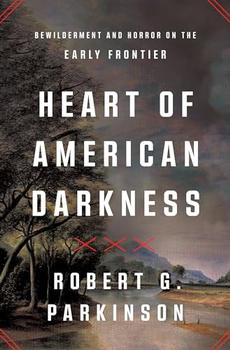
Bewilderment and Horror on the Early Frontier
by Robert G. Parkinson
An acclaimed historian captures the true nature of imperialism in early America, demonstrating how the frontier shaped the nation.
We are divided over the history of the United States, and one of the central dividing lines is the frontier. Was it a site of heroism? Or was it where the full force of an all-powerful empire was brought to bear on Native peoples? In this startingly original work, historian Robert Parkinson presents a new account of ever-shifting encounters between white colonists and Native Americans. Drawing skillfully on Joseph Conrad's famous novella, Heart of Darkness, he demonstrates that imperialism in North America was neither heroic nor a perfectly planned conquest. It was, rather, as bewildering, violent, and haphazard as the European colonization of Africa, which Conrad knew firsthand and fictionalized in his masterwork.
At the center of Parkinson's story are two families whose entwined histories ended in tragedy. The family of Shickellamy, one of the most renowned Indigenous leaders of the eighteenth century, were Iroquois diplomats laboring to create a world where settlers and Native people could coexist. The Cresaps were frontiersmen who became famous throughout the colonies for their bravado, scheming, and land greed. Together, the families helped determine the fate of the British and French empires, which were battling for control of the Ohio River Valley. From the Seven Years' War to the protests over the Stamp Act to the start of the Revolutionary War, Parkinson recounts the major turning points of the era from a vantage that allows us to see them anew, and to perceive how bewildering they were to people at the time.
For the Shickellamy family, it all came to an end on April 30, 1774, when most of the clan were brutally murdered by white settlers associated with the Cresaps at a place called Yellow Creek. That horrific event became news all over the continent, and it led to war in the interior, at the very moment the First Continental Congress convened in Philadelphia. Meanwhile, Michael Cresap, at first blamed for the massacre at Yellow Creek, would be transformed by the Revolution into a hero alongside George Washington. In death, he helped cement the pioneer myth at the heart of the new republic.
Parkinson argues that American history is, in fact, tied to the frontier, just not in the ways we are often told. Altering our understanding of the past, he also shows what this new understanding should mean for us today.
"In the American imagination, the idea of the frontier looms large as the prime shaper of our nation's character. But what actually happened on the frontier, and what does it say about the substance of American character? Robert G. Parkinson's Heart of American Darkness is a brilliant meditation on those questions. The book presents the often-brutal reality of life on the frontier through the eyes of Indigenous people and the Europeans whom they encountered in the forests and on the rivers of the Ohio River Valley region, the early frontier. This book is a vital contribution to our understanding of our country's beginnings and who we are." ―Annette Gordon-Reed, winner of the Pulitzer Prize and author of On Juneteenth
"The Heart of American Darkness traces the struggle to control the trans-Appalachian west, as European empires and later the American Republic fought to wrest control of this region from its Indigenous inhabitants. Chronicling the violence and chaos that defined this contest over the 'back country,' Robert Parkinson provides a bold new interpretation of the founding history of the United States." ―Michael J. Witgen, author of the Pulitzer Prize–finalist Seeing Red: Indigenous Land, American Expansion, and the Political Economy of Plunder in North America
"The title of Robert Parkinson's Heart of American Darkness invokes Joseph Conrad, but I also hear strong echoes of Herman Melville and Cormac McCarthy in this searing account of the American frontier. Parkinson's anti-epic is at once detailed and sweeping, a much-needed new national origins story, a tale where the bloody chaos of the past matches the bloody chaos of the present. An indispensable book." ―Greg Grandin, author of the Pulitzer Prize–winning The End of Myth: From the Frontier to the Border Wall in the Mind of America
"Robert Parkinson's gripping and memorable Heart of American Darkness provides a haunting portrait of the chaos, confusion, and shifting allegiances that swirled around the complex series of events that we now call the American Revolution." ―Karl Jacoby, author of Shadows at Dawn: An Apache Massacre and the Violence of History
This information about Heart of American Darkness was first featured
in "The BookBrowse Review" - BookBrowse's membership magazine, and in our weekly "Publishing This Week" newsletter. Publication information is for the USA, and (unless stated otherwise) represents the first print edition. The reviews are necessarily limited to those that were available to us ahead of publication. If you are the publisher or author and feel that they do not properly reflect the range of media opinion now available, send us a message with the mainstream reviews that you would like to see added.
Any "Author Information" displayed below reflects the author's biography at the time this particular book was published.
Robert G. Parkinson is associate professor of history at Binghamton University. He is the author of The Common Cause and Thirteen Clocks. He lives in Charles Town, West Virginia.
Your guide toexceptional books
BookBrowse seeks out and recommends the best in contemporary fiction and nonfiction—books that not only engage and entertain but also deepen our understanding of ourselves and the world around us.